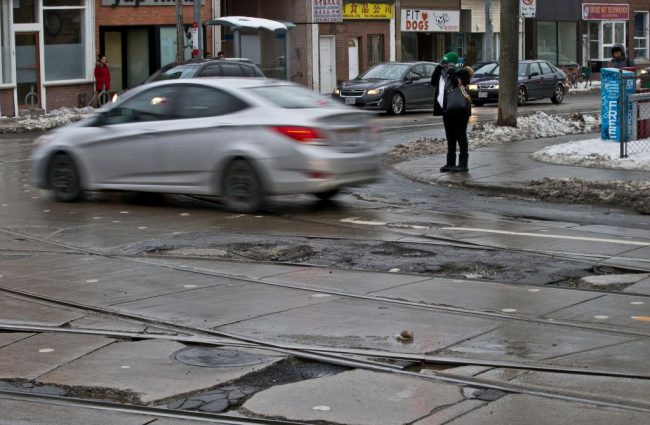OTTAWA – Late last year, officials warned that a federal spending spree to repair crumbling roads and water systems could take three years longer than expected to complete, based on internal documents outlining issues with the first tranche of cash in the government’s infrastructure program.

The Liberals had originally hoped to have cities and provinces complete $5.4 billion in transit and water system work by this March, but quickly realized that more time was needed.
A “secret” fall briefing note to Infrastructure Minister Amarjeet Sohi, obtained by The Canadian Press through the Access to Information Act, says delays hampered a large number of construction projects, requiring that the deadline be extended as far as March 2021.
READ MORE: When it comes to cheque hand-outs, the Trudeau government easily tops Harper’s record
The heavily blacked-out document predicted the majority of water and transit projects “would require extensions not only for a third year, but beyond into a fourth year (i.e. 2019-20) and fifth year (i.e. 2020-21),” referencing the federal fiscal years in brackets.
Sohi agreed to a blanket deadline extension to March 2020, turning what was to be a two-year stimulus program into a four-year plan.
He said the decision to grant extra time to 2020, instead of 2021, was based on the expected cash flow for projects and the ability for construction companies to handle all the extra work.
WATCH: Trudeau pledged infrastructure spending, so where is it?

“This is not about that projects are being delayed, it’s about taking a little longer to complete those projects or taking a little longer to have the buses manufactured because of construction and manufacturing capacity,” Sohi said in an interview from Edmonton.
“From our perspective, we made a commitment to build and rebuild infrastructure and focus on the repairs in phase 1 and … we are achieving the results we intended to achieve, but we also want to give flexibility.”
As of Friday, the federal government had approved more than 3,400 water and transit projects with a combined federal contribution valued at almost $4.2 billion. Of that money, federal coffers had only doled out about $175.6 million to date, based on figures available on the Infrastructure Canada website.
READ MORE: Toronto only Canadian city shortlisted for Amazon HQ2
Federal dollars flow once cities and provinces submit receipts for reimbursement, often creating a lag between when work takes place and when the federal money is spent.
In some cases, the federal government won’t receive receipts until a project is completely done. In other cases, projects are delayed because of labour strife, bad weather or other factors beyond Ottawa’s control.
The government says 793 projects representing about $1.8 billion in federal contributions have been granted individual extensions from Sohi. Between those extensions, and delays in filing expense claims, federal officials last year decided to shift more than $2 billion in planned spending to future years.
READ MORE: Two Canadian places that could be under water in 100 years — or sooner
Provincial and municipal officials say that the time needed to go through the funding approval process contributed to the delays.
Having officials vet the details of each proposal before getting federal approval for funding meant some cities put off breaking ground until they knew federal funding would come their way.
Alberta Infrastructure Minister Sandra Jansen said a number of cities in the province expressed the same concern: they needed more time to complete projects.
Alex Benac, a spokesman for Ontario Infrastructure Minister Bob Chiarelli, said some cities said they were struggling to meet the timeline requirements and a provision that requiring municipalities to incur 60 per cent of their costs by the end of this March.
WATCH: Conservatives question membership of infrastructure bank board

The extra time and removal of the local spending requirement has given cities “much-needed time to get shovels in the ground and keep their projects on track according to a more generous, achievable timeline,” Benac said.
Federal and provincial officials say the lessons learned from the first phase of the program will be used in designing the second phase.
Both sides want funding agreements for the second, longer and more lucrative phase of infrastructure spending signed by March.



Comments